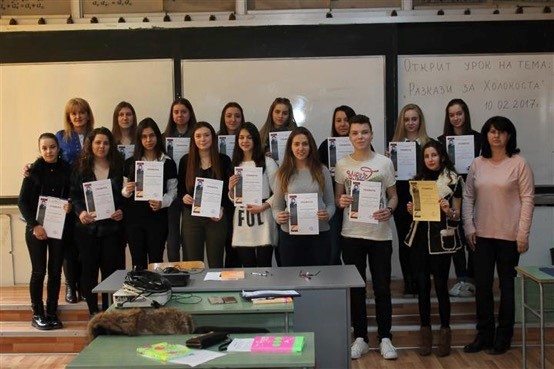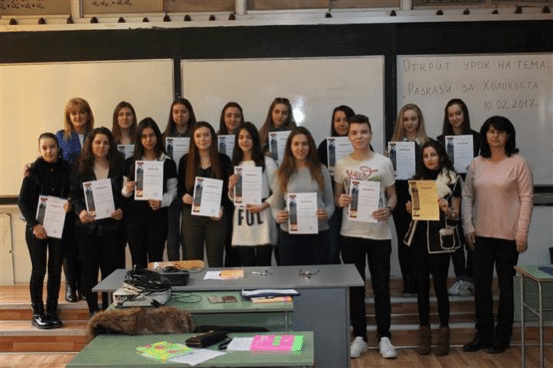Dimitrina Kirilova Zareva and Tatyana Ivanova Angelova-Krustovcheva, Dupnitsa
In this project, developed by Dimitrina Kirilova Zareva and Tatyana Ivanova Angelova-Krustovcheva in Dupnitsa, students were introduced to the topic of the Holocaust with the stories of people who survived it and the compassion of ordinary people who helped them survive. The main activities of her project were an open lesson on the International Holocaust Remembrance Day, viewing and discussing several films about the Holocaust and a visit to a museum dedicated to Dimitar Peshev, one of the main figures in the salvation of Bulgarian Jews.
A group of 50 students took part in the project. For the International Holocaust Remembrance Day, January 27, students made posters, which were placed in a visible place in the school. In February, we organized an open lesson in which students from 9th, 10th and 11th grade did multimedia presentations on the history of Holocaust and on the righteous among the nations, a topic, less familiar to the students.  The third part of the lesson was dedicated to the rescuing the Jews in Bulgaria. In the final part of the lesson students presented essays on the topic of tolerance. All the students were very assiduous in gathering materials and preparing their projects. To make the topic closer to the students, we relied on introducing passages from literature such as “Anne Frank’s Diary” and “The Book Thief” form Markus Zusak and “Denying the Holocaust” by Kenneth Sterne. All the students received diplomas and small prizes (notebooks and pens) for their participation in the open lesson.
The third part of the lesson was dedicated to the rescuing the Jews in Bulgaria. In the final part of the lesson students presented essays on the topic of tolerance. All the students were very assiduous in gathering materials and preparing their projects. To make the topic closer to the students, we relied on introducing passages from literature such as “Anne Frank’s Diary” and “The Book Thief” form Markus Zusak and “Denying the Holocaust” by Kenneth Sterne. All the students received diplomas and small prizes (notebooks and pens) for their participation in the open lesson.
Another phase of the project was dedicated to watching and discussing documentaries movies such as The Courageous Heart of Irena Sendler, Untouched by Hitler and Schindler’s List.
The final activity of the project was a trip to the Museum of Dimitar Peshev in Kyustndil city. In the museum, the students expanded their knowledge with interesting facts about his life and his role in the rescuing of the Bulgarian Jews.
We plan to continue our work on the topic of the Holocaust with different class activities like museum visits, gathering materials and connecting the topic with our present time. Our activity could also develop in the direction of examining the life and traditions of the different ethnic communities living in Dupnitsa: Bugarians, Roma, Armenians, Jews, Karakahans with the goal of creating an ethnic tolerance.
